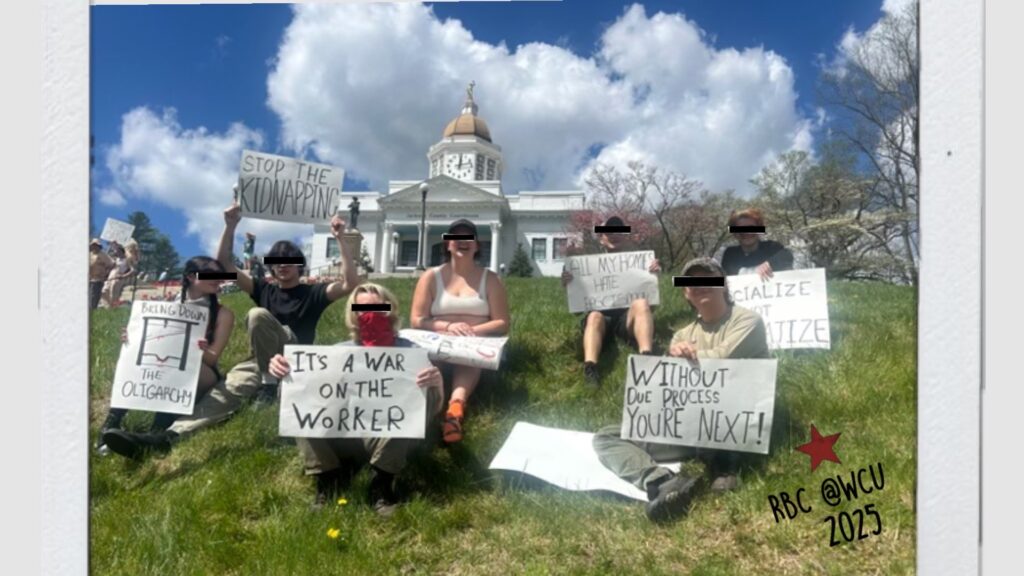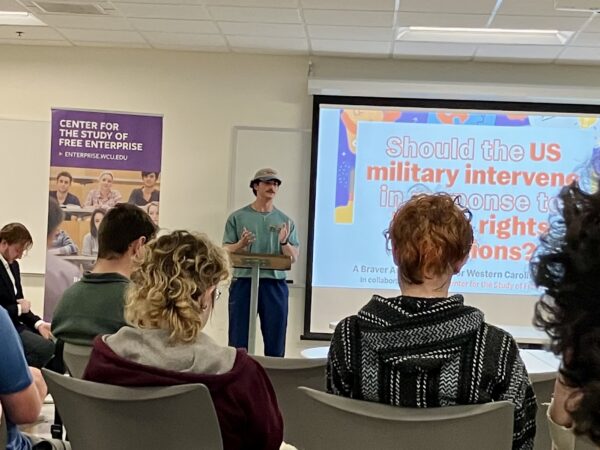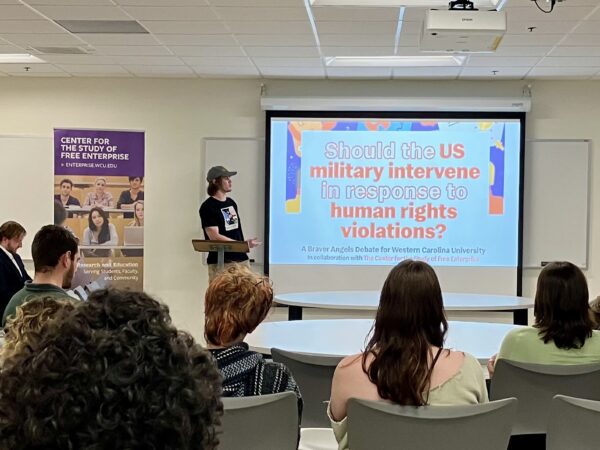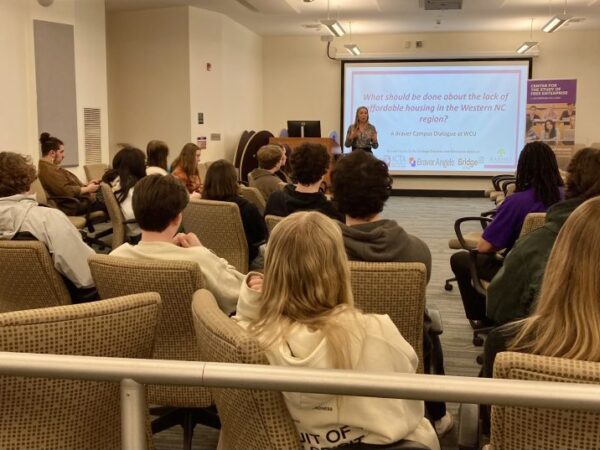
In a time of rising polarization, disinformation and civic burnout, WCU students are turning to smaller organizations like the Revolutionary Book Club, Braver Angels conversations and the Student Democracy Coalition to discuss political theory, current policies and the future.
The Revolutionary Book Club holds weekly meetings every Saturday where they read and discuss theory, current events and build a community. The club was started by Max Lynch, recent WCU transfer student. Lynch was part of the Revolutionary Student Front at University of North Carolina at Charlotte before transferring.
“We’re trying to do a program of half craft meetings where we make protest signs, stamps, stickers, patches, all that kind of stuff,” Lynch said. “And then the other side we are just going through different revolutionary literature and seeing where the value is and incorporating it into our own frameworks.”
So far, the RBC has gone through “Constructive Criticism” by Vicki Legion, an activist who worked with the Students for a Democratic Society in the late 1960s, and “Socialism: Utopian and Scientific” by German philosopher Friedrich Engels.
While most of the group is already familiar with the material they are reading in the club, they feel that discussing it with a group of people adds to their education.
“There are various kinds of resistance to the various changes of power, but they’re suppressed and sometimes they’re not. So, we look into the exceptions where they’re not and see what went right,” Lynch said.

Braver Angels is a national political non-profit that aims to stop the political division between Republicans and Democrats in the United States through civil discourses framed as debates on college campuses.
“Usually, it’s two debates a semester,” said Sean Mulholland, a professor of economics at WCU. “I’m part of it but really all I am is a part of a team of a couple students and then usually someone from the discourse alliance.”
So far this semester, Mulholland and his team of student fellows with Braver Angels have hosted one debate centered on the question “should the United States military intervene in response to human rights violations?” and another discussion on housing costs. The team tries to choose topics they think will lead to a healthy discussion.
“Our overall goal is to allow students to have a space where they can feel more comfortable talking about their personal opinions and not be attacked for feeling one way or the other,” said Tryston Weiss, one of the student fellows with Braver Angels.

The Student Democracy Coalition is a nonpartisan organization that hosts educational panels on current events and promotes civic engagement. Besides the general meetings hosted every other Tuesday, the SDC have also put together educational panels that all are welcome to attend.
These panels include important topics like executive orders, the recent federal layoffs and protesting rights.
“We wanted to direct topics that you’re going to be hearing in the news, probably every day,” said Sam Ogburn, student and president of the SDC. “We wanted to make a dialogue where people can come with their concerns and what they’ve heard and then compare that with people who have a political science background.”
Seven people showed up for a recent discussion on executive orders, including Ogburn and his vice president Savannah McGlothlin. Ogburn started the event with a lesson on the basics of executive orders and then opened it up for discussion. At the end of the discussion, the group concluded that many people have lost faith in congress and are concerned that executive orders are unconstitutional.
“We’re trying to take a more laid back, educational approach. People are burnt out from the election, and they don’t want tons of scary news popping up at the Catafount all the time,” Ogburn said.
These three organizations have different overall goals but many face the same challenges like increased political burnout, the spread of misinformation, and polarization.
“I think building community is really, really important to prevent burnout,” said Greysen Silfee, one of the communication secretaries of the RBC.
According to Sarah Hollis, another communication secretary for the RBC, attending the Hands Off Protest in Sylva on April 5 and seeing the big turnout was also beneficial for stopping her political burnout.
“I think just staying away from negative media sources is the only way you really can’t get burned out because the negativity is just, I mean, it’s daunting,” Weiss said.
Weiss believes that working with Braver Angels and promoting political education will play a role in reducing polarization on campus, something he thinks is a big issue.
“I think it could be good on like a smaller scale, but I don’t think it would really impact the country in general,” Weiss said.

The SDC battles polarization by opening their meetings to everyone and encouraging nonpartisan discussion. According to Ogburn, they would love to have more nonpartisan voices, but it is hard to reach both sides because there is no official Republican organization on campus.
On the other hand, members of the RBC believe this perceived divide will exist no matter what and instead focus their efforts on fighting disinformation about their beliefs.
“I think that the idea of leftism has been really appropriated, especially in the days of disinformation, it’s beyond misinformation,” Lynch said.
While the RBC does focus heavily on political education, many of them use that education to inspire action. According to Lynch, many members of the club have studied history and politics and express feelings of dread and hopelessness if they think about the state of the world.
“We want to educate people on what’s happening now in our current events and how they can educate themselves to protect themselves from what’s happening,” Hollis said.
The SDC also believes that it’s extremely important to stay educated about politics, according to Ogburn this education is the key to the civic engagement they promote. That includes not just voting but also protesting and calling your representatives.
“You can’t do anything unless you actually know what you’re upset about, or if you should even be upset,” Ogburn said.






